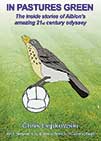 The inside stories of Albion’s amazing 21st century odyssey
The inside stories of Albion’s amazing 21st century odyssey
by Chris Lepkowski
Shareholders for Albion, £16.99
Reviewed by James Baxter
From WSC 315 May 2013
Written by West Bromwich Albion’s Birmingham Mail correspondent Chris Lepkowski, this book uses in-depth interviews with 12 players to present the inside line on “Albion’s amazing 21st century odyssey”. While the last 12 years have delivered four promotions, three relegations and the 2004-05 “great escape”, they have also seen Albion transformed from a chaotically run institution who gave Wolves fans something to joke about into one of the Premier League’s most forward-thinking clubs.
In its way, In Pastures Green reflects this transformation. The earlier interviews, especially those dealing with Gary Megson’s time, are genuinely revelatory in places. Dutch midfielder Richard Sneekes doesn’t bother to conceal his contempt for the manager, describing his style of football as requiring “running for the sake of running”. Striker Bob Taylor, meanwhile, was brought back to The Hawthorns by Megson in 2000 but, by the end of his final season three years later, he had been frozen out. He believes that Megson’s decision to allow him a start in the last fixture, at home to Newcastle, was made purely to humiliate him since he was nowhere near match fit. Taylor is further convinced that, as he was being helped off the field after sustaining an early injury, Megson was laughing and joking – “milking the situation” – on the touchline. “As a person,” Taylor concludes, “[Megson] is a shithouse.”
At the end of the book there are further criticisms of a manager (or rather head coach) but Robert Koren and Paul Scharner are far more restrained in what they have to say about Roberto di Matteo, who “kept his distance” and “didn’t like to get too close to his players” according to Koren. Scharner’s chapter offers Albion fans little beyond a story most will recall from local media reports of January 2011. This was a period when the team were going through a poor run of form and Scharner suggested that the abandonment of the players’ self-policed system of fines for minor acts of indiscipline was among the reasons.
Cancer sufferer John Hartson, who left Albion in 2008 as his health went into decline, gives by far the most moving interview, expressing regret at ignoring an appointment with a specialist that was made for him by Albion’s club doctor, Kevin Conod. “Kevin did everything in his power to help me… but doctors aren’t going to hold your hand and take you to the specialist.” There is more to In Pastures Green, including a few throwaway, if entertaining, tales of dressing-room high-jinks. For his own part, Lepkowski is a discreet narrator who allows his interviewees to tell their stories without the need for too many interjections. Shareholders for Albion, who commissioned the book, break up the narrative with regular accounts of the state of the club’s finances. Those not interested in the intricacies of share issues and the like can safely skip the passages concerned. They certainly do not detract from a fine read – one you don’t need to be an Albion fan to appreciate.



